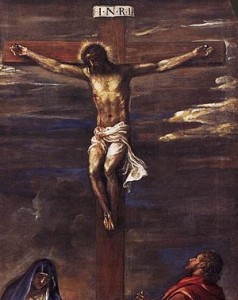In part 1 I explored some difficulties with several common responses to the question ‘Why does God allow coronavirus?’ and suggested that while we cannot explain why God has allowed so many deaths and cases of COVID-19, Christians believe that God can bring great good out of great evil and suffering. In response to the sceptic’s claim that God couldn’t have any reasons for allowing the suffering from COVID-19, I would suggest that God in his infinite wisdom may have reasons that we in our finite, limited perspective cannot fully grasp. Nevertheless, when we think about God’s purpose for human beings, we begin to see at least some of the ways in which God could bring good out of the current situation.
 Note, however, that while such a response might call into question the sceptic’s claim, it also raises a lot more questions. It is one thing to say that God can bring good out of evil and that he could have reasons for permitting the suffering, but will he and does he? And even if God does have such reasons, where is he? People are suffering and dying and God seems to be absent. Can we have any confidence that God cares?
Note, however, that while such a response might call into question the sceptic’s claim, it also raises a lot more questions. It is one thing to say that God can bring good out of evil and that he could have reasons for permitting the suffering, but will he and does he? And even if God does have such reasons, where is he? People are suffering and dying and God seems to be absent. Can we have any confidence that God cares?
I’m writing this article on Good Friday. Have you ever thought about why it is called ‘good’? How could the barbaric execution of an innocent man be considered good? Surely ‘evil’ would be a more appropriate description. In fact, humans putting to death the Son of God, the one “through whom all things were made”, highlights just how evil it was. Furthermore, from a Christian point of view, we are all responsible for Jesus’ death. Humanity as a whole was responsible for the death of the Creator. It is hard to imagine a greater evil.
So why do Christians call it ‘good’? Can the same event be both good and evil? Clearly what Judas did in betraying Jesus was not good, and neither was the decision of the Sanhedrin nor the execution by the Roman authorities. What was good, of course, was Jesus’ laying down of his life for us. Jesus’ death demonstrates God’s love in the most amazing way – it is the greatest demonstration of love in history. “This is how we know what love is: Jesus Christ laid down his life for us” (1 John 3:16).
 So, the crucifixion of Jesus demonstrates how God can bring the greatest good out of the greatest evil. We must be careful not to attribute evil to God. Yes, the sacrificial death of Jesus was something planned by God, but God was not responsible for the sinful actions of Judas and Jewish and Roman authorities. Nevertheless, God, knowing what they would do, and even bringing about the circumstances in which he knew they would freely sin, used all of this to bring about the greatest good the world has known. As Jesus put it, “The Son of Man will go just as it is written about him. But woe to that man who betrays the Son of Man!” (Mark 14:21).
So, the crucifixion of Jesus demonstrates how God can bring the greatest good out of the greatest evil. We must be careful not to attribute evil to God. Yes, the sacrificial death of Jesus was something planned by God, but God was not responsible for the sinful actions of Judas and Jewish and Roman authorities. Nevertheless, God, knowing what they would do, and even bringing about the circumstances in which he knew they would freely sin, used all of this to bring about the greatest good the world has known. As Jesus put it, “The Son of Man will go just as it is written about him. But woe to that man who betrays the Son of Man!” (Mark 14:21).
How is all of this relevant to coronavirus? First, it highlights that God’s bringing great good out of great evil is not just a theoretical possibility. It is at the very heart of the Christian faith. The whole story of the Bible is one of God doing just that. Now there are extremely important differences between the two cases. I argued in Part 1, that we should not attribute the suffering due to COVID-19 to God. In the same way, I don’t think we have any grounds for saying that God planned it or intentionally brought it about. However, God has clearly permitted it and is not taken by surprise by it. Also, unlike the crucifixion, we also don’t have a revelation to tell us that God will bring good out of it. However, given how God brings good out of evil, it is a very real possibility that he will use it to bring about good in ways we cannot conceive.
Second, it highlights that God is not remote. He is not simply calculating what to do in a detached and uncaring way. God has entered our world and shared in our suffering. As the Christian philosopher Alvin Plantinga has put it (‘Self-Profile’, in J. E. Tomberlin and P. van Inwagen (eds.), Alvin Plantinga, Profiles, p. 36):
He was prepared to accept this suffering in order to overcome sin, and death, and the evils that afflict our world, and to confer on us a life more glorious than we can imagine. So we don’t know why God permits evil; we do know, however, that he was prepared to suffer on our behalf, to accept suffering of which we can form no conception.
So where is God in the current crisis? He is with us in our suffering, in our weeping, in our mourning, in our reaching out to others in their time of need, in our battle against this evil. And he desperately wants us to reach out to him in the midst of this crisis, so that we can find our purpose in him and play our part in what he wants to do.
Third, it shows that we can trust God even if we cannot understand his ways. I have suggested that God could bring good out of the coronavirus crisis, but even if we don’t know how that can happen, we can still trust that God is in control and that he has good reasons for permitting this. A God who dies on the cross is a God who can be trusted. And this is not just a trust based on emotions, but a trust based on the evidence of what God has done in history.
Finally, it provides us with a basis for hope. It would be easy to become hopeless in the current situation. And if there is no God, or a god who is remote and disinterested, such hopelessness might be justified. But if there is a God who loves us, who sent his Son into the world to die for us, who offers us forgiveness, who wants us to come into a loving relationship with himself, and who has defeated death and invites us into a new life that goes beyond this life into eternity, then there is hope in the midst of the current crisis.

